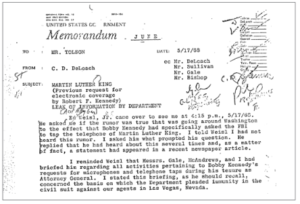Tag: politics
Primary Sources: FBI Confidential Files and Radical Politics in the U.S., 1945-1972
 Another recent acquisition of the Library is the ProQuest History Vault module, FBI Confidential Files and Radical Politics in the U.S., 1945-1972. Under the leadership of J. Edgar Hoover, the FBI vigorously investigated and tracked the activities of Communist groups, Communist-front groups, and other radical organizations in the U.S. This module consists of records of the FBI and the Subversive Activities Control Board from 1945-1972.
Another recent acquisition of the Library is the ProQuest History Vault module, FBI Confidential Files and Radical Politics in the U.S., 1945-1972. Under the leadership of J. Edgar Hoover, the FBI vigorously investigated and tracked the activities of Communist groups, Communist-front groups, and other radical organizations in the U.S. This module consists of records of the FBI and the Subversive Activities Control Board from 1945-1972.
Highlights of this module include J. Edgar Hoover’s office files; documentation on the FBI’s so-called “black bag jobs,” as they were called before being renamed “surreptitious entries”; and the “Do Not File” File. The “Do Not File” file consists of records that were originally supposed to be destroyed on FBI Director J. Edgar Hoover’s order, however, through both intended and inadvertent exceptions to this order, large portions of these files survived. Another key collection in this module consists of the records of the Subversive Activities Control Board (SACB). The SACB files constitute one of the most valuable resources for the study of left-wing radicalism during the 1950s and 1960s.
Protecting the California Coast: New Interviews with Joe Bodovitz and Will Travis
Just over 50 years ago the California State Legislature established the Bay Conservation and Development Commission (BCDC). This commission was charged with protecting the San Francisco Bay from unchecked development and with providing access to this great natural resource. In 1972, citizens throughout California voted to establish the Coastal Commission, which had a charge similar to the BCDC but its authority ran the entire coastline of California. Today we are pleased to release to new oral history interviews with two of the most important figures in both of those organizations: Joe Bodovitz and Will “Trav” Travis.
Joseph Bodovitz was born Oklahoma City, Oklahoma in 1930. He attended Northwestern University, where he studied English Literature, served in the US Navy during the Korean War, and then completed a graduate degree in journalism at Columbia University. In 1956 he accepted a job as a reporter with the San Francisco Examiner, reporting on crime, politics, and eventually urban redevelopment. He then took a position with SPUR (San Francisco Planning and Urban Research) where he launched their newsletter. In 1964 he was enlisted to lead the team drafting the Bay Plan, which resulted in the creation of the San Francisco Bay Conservation and Development Commission (BCDC) by the state legislature in 1969. Bodovitz was hired as the first executive director of BCDC. In 1972 he was hired by the newly-established California Coastal Commission to be its first executive director. He left the Coastal Commission in 1979 and shortly thereafter was named executive director of the California Public Utilities Commission, a position he held until 1986. He served as head of the California Environmental Trust and then as the project director for BayVision 2020, which created a plan for a regional Bay Area government. In this interview, Bodovitz details the creation of the BCDC and how it established itself into a respected state agency; he also discusses the first eight years of the Coastal Commission and how he helped craft a strategy for managing such a huge public resource ? the California coastline. He further discusses utilities deregulation in the 1980s and the changing context for environmental regulation through the 1990s.
Will Travis was born in Allentown, Pennsylvania in 1943. He attended Penn State University as both as an undergraduate and graduate student, studying architecture and regional planning. From 1970 to 1972 he worked as a planner for the then nascent San Francisco Bay Conservation and Development Commission (BCDC). In 1972 moved to the newly established California Coastal Commission, where worked in various capacities until 1985. In 1985 Travis returned to BCDC first as deputy director then as the agency?s director beginning in 1995. He retired from BCDC in 2011 and continues to work as a consultant. In this life history interview, Travis discusses his work both the BCDC and the Coastal Commission, focusing on accounts of particular preservation and development projects including the restoration of marshland areas around the San Francisco Bay. The interview also covers in detail Travis?s work documenting the threat of sea level rise as a result of climate change and how the Bay Area might plan for such a transformation.